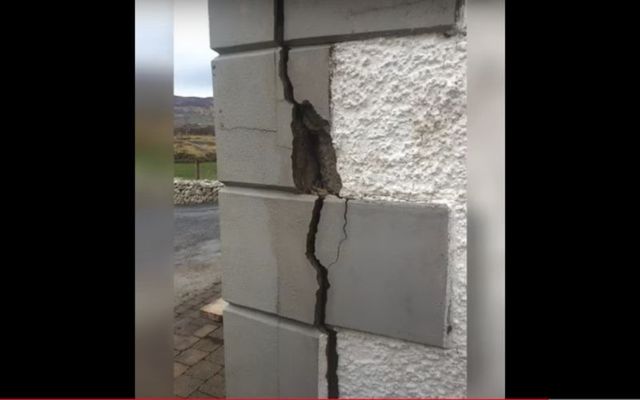This week, County Donegal homeowners took to the streets to protest a long-running scandal affecting thousands of now crumbling homes built there in the early 2000s
Concrete mica bricks that contain minerals that quickly absorb water were used to build thousands of new homes in two of the most rain-hit counties in Ireland, with entirely predictable results.
The water absorption caused the houses to crack, crumble and even disintegrate, turning what should be a sanctuary into a threat. Locals claim their homes were built with materials that turned out to be no stronger than Weetabix, the popular cereal that quickly dissolves in milk.
Does this look fit for purpose to you? @LeoVaradkar @MichealMartinTD @DarraghOBrienTD
— charlie doherty (@charliedoherty0) May 25, 2021
Bad enough paying for labour and products once in this country never mind having to fork out another ball of money to get your home fixed again
The scheme is not fit for purpose! #micaredress pic.twitter.com/RDhqNnhWDK
It didn't help matters that in many cases, the bricks used to build these houses were made locally, but local suppliers point to the fact they were following the national regulations of the period, which means the buck finally stops with the government.
Either way, families have seen their hopes dashed as some now have to abandon their dream homes for their own safety. Hearing that your new home is effectively condemned a few years after you turn the key has been devastating to many homeowners.
The speed with which their homes have deteriorated has been remarkable. Families have found themselves living in structures that begin to crumble almost immediately, with the foundations effectively disintegrating beneath them, then they face the expense of massive structural repair or having to move out.
A government redress scheme to provide 90 percent of the repair costs has been strongly criticized because for many to join it and have various reports carried out on their homes costs more than €5,000, which many affected homeowners claim after all the repair work already carried out, they simply no longer have.
@LeoVaradkar @MichealMartinTD @DarraghOBrienTD My husband and I have worked approx 70yrs combined and built home and now face being homeless due to greed of defective block supplier. 8 cores 1 critical and rest serious #micaredress #100percentredress #donegal #Mayo pic.twitter.com/PIZ9Kwd0b3
— lisa rodgers (@lisarod49068728) May 27, 2021
The government paid billions to bail out the bankers and bondholders in 2008, but where is our relief, affected homeowners grouse? Since the homes were built with defective blocks nevertheless that met the national standard, why are homeowners on the hook for a policy they didn't write, they ask?
This past weekend, a protest of more than 10,000 people assembled in Buncrana, County Donegal (full disclosure, my hometown) to demand the government provide full backing to affected homeowners. The current scheme is costly and ineffective, they insisted at a rally and protest march that concluded on the town green.
Donegal, the forgotten county was on the street today to protest the injustice that is the Mica redress scheme. Give these families the same 100% redress that was given to the families affected by Pyrite! #100%redress #mica #Donegal pic.twitter.com/itpP7qgFZD
— Badhca Ni Dhín (@BronaghNiDhn) May 22, 2021
Despite the large numbers at the protest, the story was not covered on the evening news broadcasts, reminding locals that the concerns of the northwest are often overlooked when it causes Dublin some political discomfort.
But this isn't going away. 'Are you going home?' is a question that Irish immigrants ask each other around major holidays, home in the first instance meaning Ireland, then their home county and then their home town. It's one of the most emotive, meaning-filled words we ever use.
A typical example of the homes thousands are, or will be, living in because of defective blocks. #Donegal #micaredress. Through no fault of their own. pic.twitter.com/RM1rcgJThL
— Greg Hughes (@GregHughes2) May 25, 2021
Because to us, home is more than just an address, it's more than a random collection of memories, it's a lodestar we consult throughout our whole lives, the map we use to remember who we were and who we have become since. So what happens when, through no fault of our own, our Irish homes are threatened?
Finding the answer to that will be the job of both the protestors and the government in this lamentable scandal. It is estimated that in Donegal alone 4,800 private homes are likely affected by damage.
Since the vast majority of the mica-affected homes are located on the Inishowen Peninsula in Donegal, protestors fear their remoteness from the corridors of power will see their concerns overlooked.

Worse, hundreds of families have discovered their loans from local banks to carry out essential repair work to their crumbling homes have been sold to Ireland's newest colonial masters, cruel overseas vulture funds.
It is unlikely these vulture funds will come to sustainable repayment arrangements with the affected homeowners when their properties are often worth more to them in ruins rather than repaired.
Local banks care little and vulture funds care less about the crisis or whose fault it is and so homeowners who are in arrears of only €3,000 have heard they have had their mortgages sold to vulture funds.
In Donegal now, until the government shows real leadership on the issue, home is where the heartache is.




Comments